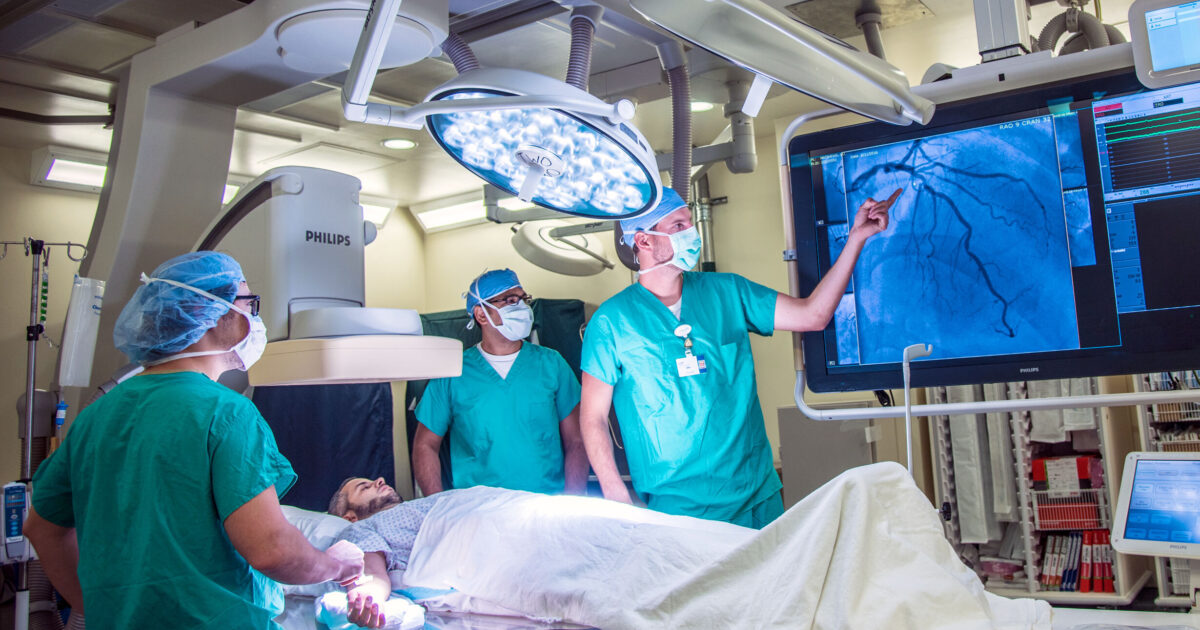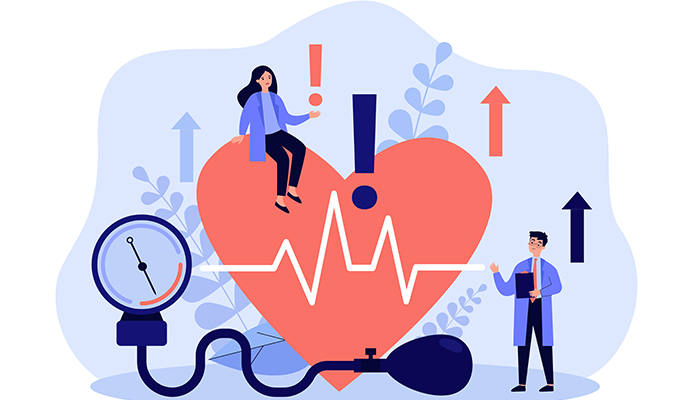What to expect from your first Cardiologist near me appointment
What to expect from your first Cardiologist near me appointment
Blog Article
Recognizing the Importance of Cardiology in Modern Healthcare Services
Cardiology plays a vital duty in modern-day healthcare, particularly as heart problem continues to be the leading source of mortality worldwide. Developments in diagnostics and treatment have actually transformed patient care, enabling earlier interventions and improved outcomes. The change towards precautionary cardiology equips individuals to handle their wellness proactively. As modern technology proceeds to progress, the assimilation of cutting-edge options may even more redefine cardiology's effect on public wellness, triggering a better exam of emerging patterns and their effects.
The Occurrence of Heart Illness and Its Effect On Public Health
Although heart disease remains the leading reason of fatality internationally, its effect extends much past specific people to impact public health systems and economic situations. The high prevalence of cardiovascular disease places a significant stress on healthcare sources, necessitating raised funding for rehabilitation, treatment, and avoidance programs. Public health campaigns must attend to risk variables such as weight problems, smoking cigarettes, and sedentary way of lives, which add significantly to the increasing occurrence of heart conditions.Moreover, the economic burden connected with cardiovascular disease is tremendous, encompassing not only straight clinical prices but likewise indirect expenditures connected to lost performance and premature mortality. Neighborhoods encounter challenges in managing these expenses, commonly resulting in differences in medical care access and outcomes. As the population ages and lifestyle-related dangers proceed to rise, the seriousness for efficient cardiology treatments comes to be paramount. Consequently, dealing with heart problem is not just a matter of private wellness yet also a vital public health and wellness concern.
Breakthroughs in Heart Diagnostics and Imaging Techniques
Current improvements in cardiac diagnostics and imaging techniques have revolutionized the field of cardiology, enhancing the ability to detect and monitor cardiovascular disease. Methods such as heart MRI, CT angiography, and echocardiography have become increasingly innovative, giving in-depth pictures of heart frameworks and functions. These techniques permit the very early recognition of conditions like coronary artery disease, cardiac arrest, and valvular disorders.Moreover, improvements in non-invasive diagnostics, such as wearable innovation and remote monitoring tools, have actually empowered people and health care companies. These tools facilitate real-time monitoring of heart rhythms and other essential indications, resulting in prompt interventions. In addition, fabricated intelligence is being incorporated into imaging evaluation, improving precision and efficiency in medical diagnosis.
Innovations in Therapy Alternatives for Heart Conditions
Current advancements in cardiology have led to considerable technologies in therapy alternatives for heart conditions. These consist of advanced surgical strategies that enhance procedural outcomes and arising medications that provide brand-new avenues for therapy. As the area advances, these developments play an important duty in improving person care and results.
Advanced Surgical Techniques
Technologies in surgical methods have actually changed the landscape of cardiology, providing new wish for people with heart problems. Minimally invasive procedures, such as catheter-based interventions, have actually substantially reduced recovery times and healthcare facility keeps. Techniques like robotic-assisted surgical treatment improve accuracy, permitting doctors to browse intricate anatomical structures with better precision. Innovations in imaging modern technology promote real-time visualization throughout treatments, boosting end results. Transcatheter aortic shutoff substitute (TAVR) exhibits an innovation in dealing with aortic constriction, allowing valve replacement without open-heart surgery. Additionally, hybrid methods that combine surgical and catheter-based approaches supply tailored services for various cardiac concerns. These innovative medical methods not only boost individual security yet additionally broaden treatment options, emphasizing the important function of development in modern cardiology practices.
Arising Medicines and Therapies
As the landscape of cardiology continues to advance, emerging medicines and therapies play an essential role in boosting therapy options for heart conditions. Innovations such as novel anticoagulants and progressed lipid-lowering agents have actually transformed the monitoring of cardiovascular conditions, considerably decreasing patient morbidity and death. Additionally, the advancement of genetics therapies and regenerative medication uses appealing methods for treating problems previously considered irreparable. Scientific tests are constantly disclosing the effectiveness of these treatments, pushing the limits of typical treatments. In addition, the combination of digital wellness innovations facilitates individualized medication, enabling customized therapy strategies based on hereditary and lifestyle aspects. Collectively, these improvements emphasize the vibrant nature of cardiology, improving patient results and redefining criteria of care in modern health care.
The Function of Preventive Cardiology in Individual Treatment
Preventative cardiology plays an essential role in individual treatment by concentrating on the recognition of threat factors that contribute to heart disease. Through way of living alteration strategies and early detection techniques, healthcare service providers can successfully minimize the occurrence of cardio occasions - Cardiologist near me. This aggressive strategy not just enhances individual end results yet likewise promotes long-term health
Threat Variable Recognition
While heart diseases continue to be a leading source of morbidity and mortality worldwide, effective threat variable recognition works as a cornerstone of precautionary cardiology. Recognizing threat factors such as hypertension, hyperlipidemia, family members, and diabetic issues background is necessary for early treatment. Health care professionals make use of different evaluating techniques to examine these elements, permitting for tailored safety nets. Additionally, recognizing a client's lifestyle choices, such as cigarette smoking and physical lack of exercise, even more informs threat assessments. This detailed analysis enables medical professionals to develop individualized care plans targeted at mitigating risks. By focusing on risk aspect identification, health care systems can boost patient results and lower the overall concern of cardio diseases, eventually adding to improved public health methods and source allocation.
Way Of Living Adjustment Methods
A multitude of studies highlights the important duty of lifestyle modification methods in reducing heart disease danger. These approaches encompass dietary changes, enhanced exercise, smoking cigarettes cessation, and weight administration. By taking on a heart-healthy diet regimen abundant in fruits, veggies, entire grains, and lean healthy proteins, people can decrease cholesterol levels and blood pressure. Regular exercise enhances the heart and boosts general cardiovascular health and wellness. In addition, quitting smoking cigarettes considerably minimizes the danger of cardiovascular disease and improves recuperation prices for those with status discover this info here quo. Weight administration additionally adds to cardiovascular health by mitigating other danger elements such as diabetes and hypertension. Implementing these way of living transforms not just promotes individual well-being but additionally offers as a foundation of preventive cardiology in patient treatment.
Early Detection Techniques
Way of living alterations considerably add to reducing cardio illness risks, but they are most efficient when coupled with early discovery methods. Preventive cardiology stresses the relevance of determining prospective heart issues prior to they intensify right into severe conditions. Methods such as blood pressure surveillance, cholesterol screening, and progressed imaging innovations like echocardiograms play essential duties in assessing cardio health and wellness. Biomarkers and hereditary testing additionally improve the accuracy her response of very early detection, permitting tailored preventative strategies. Normal cardiac danger evaluations equip healthcare carriers to intervene proactively, possibly avoiding cardiovascular disease and strokes (Cardiology). By integrating these early discovery approaches into regular treatment, individuals can take advantage of timely way of life treatments and targeted therapies, ultimately enhancing and enhancing end results quality of life
Integrating Innovation Into Cardiology Practices
As innovations in technology remain to improve numerous areas, the combination of cutting-edge tools and systems into cardiology methods has ended up being crucial for enhancing client treatment and end results. Telemedicine systems allow cardiologists to monitor clients remotely, enhancing access to care while minimizing the problem on medical care facilities. Wearable devices, such as smartwatches, enable continuous heart rate surveillance, alerting both patients and physicians to prospective issues in real-time. Additionally, expert system (AI) is being utilized to analyze vast quantities of cardiac information, aiding in very early medical diagnosis and tailored therapy strategies. Advanced imaging methods, including 3D echocardiography, improve visualization of heart frameworks, causing much more accurate interventions. Digital health documents (EHRs) enhance person details monitoring, making sure that cardiologists have instant access to essential information. With each other, these technological developments are transforming cardiology, advertising aggressive administration and improved health end results for people with cardio conditions.
The Value of Client Education And Learning and Interaction
Person education and learning and interaction play a pivotal function in the management of cardiovascular wellness. By gearing up people with knowledge concerning their conditions, therapy options, and way of life changes, health care carriers empower people to take an energetic role in their care. This positive method can result in enhanced adherence to recommended medications, nutritional adjustments, and exercise programs, inevitably reducing the danger of complications.Engagement additionally cultivates a strong patient-provider relationship, motivating open communication and count on. When individuals really feel educated and involved, they are more probable to voice worries and ask inquiries, which can bring about much better scientific end results. In addition, educational resources, such as workshops or digital platforms, can enhance understanding and promote self-management strategies. Generally, focusing on person education and learning and involvement is essential for enhancing cardiovascular health, improving quality of life, and decreasing health care expenses connected with heart diseases.
Future Trends in Cardiology and Their Potential Impact

Often Asked Concerns
What Lifestyle Changes Can Lower Cardiovascular Disease Risk?
The existing question addresses way of life changes that can substantially minimize cardiovascular disease threat. Cardiologist near me. Adopting a well balanced diet plan, participating in normal exercise, maintaining a healthy and balanced weight, handling tension, and avoiding cigarette can significantly boost cardio health
Just How Can I Acknowledge Very Early Indications of Heart Problems?
Acknowledging early indications of heart problems entails monitoring signs and symptoms such as breast discomfort, shortness of breath, exhaustion, and uneven heartbeat. Prompt awareness of these signs can motivate required clinical analysis and intervention for much better end results.
What Are the Differences In Between Cardiologists and Heart Surgeons?
The differences between cardiologists and heart surgeons hinge on their functions; cardiologists primarily handle and detect heart disease via non-invasive methods, while heart doctors carry out procedures to fix architectural heart concerns. Each plays an important, unique role.

How Frequently Should I Get My Heart Wellness Checked?
The regularity of heart health and wellness checks differs based on individual threat variables. Normally, adults should undertake examinations every one to 2 years, while those with current conditions might call for more constant evaluations as recommended by healthcare specialists.
What Function Does Genes Play in Heart Illness Risk?
Genes considerably influences heart disease risk, with domestic patterns suggesting acquired conditions. Details genes can incline individuals to high blood pressure, cholesterol problems, and various other cardio problems, highlighting the value of hereditary screening in evaluating heart health and wellness. Heart disease remains the leading cause of fatality internationally, its impact expands much past private people to affect public health systems and economic situations. Public wellness campaigns have to resolve danger variables such as excessive weight, smoking, and sedentary lifestyles, which contribute substantially to the rising occurrence of heart conditions.Moreover, the financial concern linked with heart illness is enormous, including not just straight clinical costs but also indirect expenditures associated to shed productivity and premature death. Precautionary cardiology plays a crucial function in individual care by concentrating on the recognition of risk aspects that add to heart disease. Synthetic intelligence (AI) and equipment knowing are enhancing diagnostics review and person tracking, enabling early discovery of heart diseases. The differences in between cardiologists and heart surgeons lie in their functions; cardiologists largely detect and manage heart problems through non-invasive techniques, while heart doctors execute medical procedures to remedy structural heart issues.
Report this page